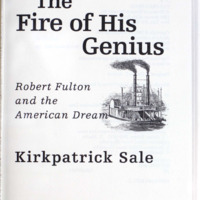-
Title
-
The fire of his genius : Robert Fulton and the American dream
-
Description
-
None of the well-dressed crowd that gathered on the Hudson River side of Lower Manhattan on the hot afternoon of August 17, 1808, could have known the importance of the object they had come to see and, mostly, deride: Robert Fulton's new steamboat, the North River, the boat that is frequently - and wrongly - remembered as the Clermont. But, as Kirkpatrick Sale shows in this biography of Fulton, the North River's successful four-day round-trip to Albany proved a technology that would transform nineteenth-century America, open up the interior to huge waves of settlers, create and sustain industrial and plantation economies in the nation's heartland, and destroy the remaining Indian civilizations and most of the wild lands on which they depended. The North River's four-day trip introduced the machines and culture that marked the birth of the Industrial Revolution in America. The Fire of His Genius tells the story of the extraordinarily driven and ambitious inventor who brought all this about, probing into the undoubted genius of his mind but, too, laying bare the darker side of the man - and the darker side of the American dream that inspired him.--BOOK JACKET.
-
Identifier
-
984815
-
068486715X
-
Creator
-
Sale, Kirkpatrick
-
Source
-
Brian Lamb Booknotes Collection
-
Gift of Brian Lamb, 2011.
-
Catalog record
-
Language
-
eng
-
Date
-
2001
-
Program air date: November 25, 2001
-
Publisher
-
Free Press
-
George Mason University. Libraries. Special Collections & Archives
-
Text
-
Transcription of Annotations
Notes from front endpapers: "Shaped America's destiny; Cotton gin 1793, Steamboat 1807. - Colt Firearms System. - Fulton: b. Nov. 1765, 20 miles from Lancaster, PA; father: farmer; relationship with a man; miniature painter; d. Feb. 23, 1815 (50). - 3 1/2 yrs. in Devon. - Was he an artist? Was he a homosexual? - Lord William Courtenay. - Benjamin West. - Canal steamers. - 1797: Fulton in Paris at 31, p. 65. - Ruth Barlow, Joel Barlow and Fulton lived together. - John Baker Church gave loan of 500 pounds. - Submarine and torpedoes. - In France - invented Panorama and Rope Making machine. - Central ambition of Fulton's: build weapons of war, p. 180. - John Marshall breaks monopoly in 1824, after death. - A nation engrained in violence, p. 203." -- Notes from back endpapers: "Destruction of the Indian societies - hordes of whites move toward Midwest. - Army: 40 major engagements form 1801 to 1845; Indians crushed. - Andrew Jackson, p. 199: Western President, 1828; rough and ready. - Robert Livingston [Fulton?] dies 1813; buried at Trinity Church; 16 boats built in his lifetime (13 still running); Harriet remarried quickly. - He tried to interest other governments in his torpedoes - treason? - Health 1813: facial boil. - 4 children, wife Harriet - he neglected her. - He wanted to be Secretary of War, 1812-1814. - Mines; submarines; torpedoes; steamships; underwater cannon, 1813; the patents; small canals; Erie Canal, 1825; harpoon gun." - Annotations by Brian Lamb in the margins and underlining of pertinent phrases throughout the book.
-
Subject
-
"Fulton, Robert, 1765-1815."
-
"Marine engineers--United States--Biography."
-
"Inventors--United States--Biography."
-
"Steamboats--History."
-
Relation
-
Original Booknotes interview
-
Rights
-
This work may be protected by copyright laws and is provided for educational and research purposes only. Any infringing use may be subject to disciplinary action and/or civil or criminal liability as provided by law. If you believe that you are the rights-holder and object to Mason’s use of this image, please contact speccoll@gmu.edu.
 984815.pdf
984815.pdf